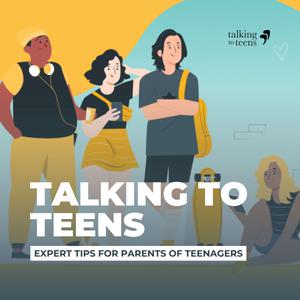
Parenting teenagers untangled - parents of teens talking about how to use mindfulness to reduce anxiety and improve your communication.
Rachel Richards and Susie Asli
An audio hug for parents of teenagers, hosted by two mums who’re currently on the frontline. We can all be great parents by learning how to build a deep, trusting relationship with our teens. We aim to understand the world through their eyes; to calm our fears by learning how to give them a safe space to talk and tackle their own problems, with us by their side. As one listener put it 'I thought I needed to fix my teen, now I realise I need to understand them.'In each episode, we discuss expert advice on everything from helping your teens with anxiety, staying motivated at school, creating rules they’ll follow, and coping with the stresses of modern parenting. Through making this podcast we’ve learned it’s never too late to connect with our kids, build a strong relationship, and actually enjoy parenting them.You can find us at Www.teenagersuntangled.com. https://instagram.com/teenagersuntangled?igshid=OGQ5ZDc2ODk2ZA==. Find courses with Susie at amindful-life.co.uk/
- 35 minutes 41 secondsFOMO: Why we feel it, how marketing and media companies are using it against us, and how to help your teen.
88:
Missing out can cause visceral pain; particularly for teenagers, but why is it so awful and can anything be done to help them with it?
This episode was inspired by a parent whose daughter is at an expensive private school, but the family are finally having to accept that they can't afford it and will have to withdraw her. We love our, kids and want the best for them, but why choose something that's a massive stretch for us? What is 'the best' and where do we get our ideas from?
I would argue that FOMO is at the root of the decision to put her there, and even the daughter's request a Hermes handbag, rather than a present more suitable for a young girl.
In this episode we talk about where our desires come from and why our social environment can have such an impact. We discuss why figuring out, and staying anchored to, our own values whilst getting our kids to find something that really matters to them, is at the heart of protecting us from the pain of FOMO.
RESOURCES USED:
https://mo-issa.medium.com/ren%C3%A9-girards-mimetic-theory-changed-the-way-i-looked-at-my-own-desires-3ed029d042bf
https://www.verywellmind.com/how-to-cope-with-fomo-4174664
https://www.theteenmagazine.com/what-teens-need-to-know-about-fear-of-missing-outThanks for listening.
Neither of us has medical training so please seek the advice of a specialist if you're not coping.
Please hit the follow button if you like our podcast, and share it with anyone who might benefit. You can review us on Apple podcasts by going to the show page, scrolling down to the bottom where you can click on a star then you can leave your message.
Rachel’s email is [email protected] The website has a blog, searchable episodes, and ways to contact us:
www.teenagersuntangled.com
Instagram: https://www.instagram.com/teenagersuntangled/
Facebook: https://m.facebook.com/teenagersuntangled/
Susie is available for a free 15 minute consultation, and has a great blog:
www.amindful-life.co.uk15 May 2024, 3:00 am - 33 minutes 54 secondsNagging: Reducing the friction using the magic of routine.
88: Is it a constant battle to get your teens to do the right thing? Getting them to bed on time, eating healthily, keeping their screen time to an acceptable level are all problems that come up regularly. So when a listener asked for a script to use to get her teens into bed I decided that it was worth delving into what other parents are doing right and how we can adapt their behaviour to our own households.
The research has made me rethink my own life structure and the importance of routine in decluttering my life.
KEY REFERENCES:
Atomic Habits - James Clear
Podcast with Angela Duckworth - No Stupid Questions - 186 Do You Need a Routine?
App I've started using: Streaks
RESOURCES USED:
https://www.mind.org.uk/information-support/your-stories/the-importance-of-routine/
https://zapier.com/blog/daily-routines/
https://journals.lww.com/iycjournal/fulltext/2007/10000/Family_Routines_and_Rituals__A_Context_for.2.aspx
https://www.ncbi.nlm.nih.gov/pmc/articles/PMC6378489/
SOME LISTENER RESPONSES:
Melissa: I don't think I said much. Other than you sleep better if you don't do tech just before bed. I think intially the cut off was an hour before bedtime. Which gave flexibility to give them a ten minute warning etc. Son mostly now stops tech before without prompting.
Grant: As part of screen time, there is an option to set down time on each of their devices. It works well for us.
Natalie: No phones, laptops or TVs in their rooms after 9.30pm but equally we, as parents, have to do the same. Read before bed, everyone asleep by 10.30pm latest on a school night. Not had to resort to plan B yet (WiFi turned off) as they do it. Lead by example. Also no phones or TV at dinner and we all eat together every night. I'm a big believer in systems and routines. Less arguments as no suprises.
Ashleigh We try and stick to 8pm cut off. And it helps when they have sports training they need to sleep for
Holly
We have a 9pm cutoff. Phone gets plugged in in the hallway outside the room
Sarah I have a cut off too. I started this when they were younger and then each year gradually increased the cut off, but they had to prove to me that they could come off their devices at the allotted time and get up for school the next day without any arguments. If they didn’t come off at the agreed time or were difficult the next morning, the agreement was that they would lose some screen time the next night by coming off earlier.I work on a “prove you can be trusted” basis with both my teens for almost everything. I rarely have trouble with them as they can see the benefits of trust e.g. they get to do more! it’s worked wonders for my 17 year old who is having the time of her life going to lots o
Thanks for listening.
Neither of us has medical training so please seek the advice of a specialist if you're not coping.
Please hit the follow button if you like our podcast, and share it with anyone who might benefit. You can review us on Apple podcasts by going to the show page, scrolling down to the bottom where you can click on a star then you can leave your message.
Rachel’s email is [email protected] The website has a blog, searchable episodes, and ways to contact us:
www.teenagersuntangled.com
Instagram: https://www.instagram.com/teenagersuntangled/
Facebook: https://m.facebook.com/teenagersuntangled/
Susie is available for a free 15 minute consultation, and has a great blog:
www.amindful-life.co.uk8 May 2024, 3:00 am - 50 minutes 12 secondsSchool: Angry kids, bad behaviour, and school avoidance. What can parents and teachers do?
87: Nearly one in five teachers in England has been hit by a pupil this year, according to a BBC survey.
But it's not just in England. Stricter school discipline is making a comeback to Australian classrooms in a bid to help teachers stamp out disruptive behaviour. France is bringing back school uniforms to tackle the issue, and in America, more than 70% of 1,000 educators said in a recent national survey that students are misbehaving more now than they did before the pandemic in 2019.Meanwhile, teachers are leaving the profession faster than they're joining in the UK, and school avoidance rates are at an all-time high. It's a complex issue that Simon Currigan talks about a lot on his podcast, School Behaviour Secrets.
In this conversation he gives us his version of what's happening, gives us a top tip on how to deal with a teen when they've lost control, the importance of asking why... at least five times, and gives us a framework for understanding school avoidance.
NOTES TO SUPPORT THE PODCAST:
SEND - Special Educational Needs and Disability
SEMH - Social Emotional Mental Health needs; part of SEND
EMOTION COACHING:- Empathise with their position - connection before correction.
- Boundaries based on values.
- Problem-solving - get them to engage in coming up with solutions.
The Toyota Five
RAIDED framework for understanding school avoidance:- Relationship problem
- Anxiety
- Identity - what do people like me do in a situation like this?
- Direction - where they are focusing so it can be a desire to be out of school because of what's happening at home.
- Environment - is the school too overstimulating or do they have sensory needs?
- Dislocation - do they feel unwelcome in the school community, as if they don't belong.
Thanks for listening.
Neither of us has medical training so please seek the advice of a specialist if you're not coping.
Please hit the follow button if you like our podcast, and share it with anyone who might benefit. You can review us on Apple podcasts by going to the show page, scrolling down to the bottom where you can click on a star then you can leave your message.
Rachel’s email is [email protected] The website has a blog, searchable episodes, and ways to contact us:
www.teenagersuntangled.com
Instagram: https://www.instagram.com/teenagersuntangled/
Facebook: https://m.facebook.com/teenagersuntangled/
Susie is available for a free 15 minute consultation, and has a great blog:
www.amindful-life.co.uk1 May 2024, 4:00 am - 34 minutes 30 secondsSandwich Generation parents: Boomers to the left of me, teens to right, stuck in the middle with menopause.
86: My aunt and uncle provide a huge amount of free childcare so that their son and daughter-in-law can work, but many say that's not been their experience. The Boomers have become notorious as a generation who are known to have reaped the rewards of the post-war boom but who appear to be more interested in travelling and enjoying themselves than supporting the next generation in their child-rearing struggles.
Having a living parent who's 65 or older whilst raising a child under 18 is Pew Research's definition of someone in the Sandwich Generation. Being a Sandwich Generation parent in an ailing economy, means being pulled in many directions at the same time.
Pew says 'not only do many provide care and financial support to their parents and their children, but nearly four-in-ten (38%) say both their grown children and their parents rely on them for emotional support.'In this episode we talk about the trials of the Sandwich Generation, and it's rather more nuanced than the headlines make it sound. We discuss how important it is for us all to build community, to have open discussions about our needs and expectations, and to live in the season of our life.
GENERATION: PEW RESEARCH DEFINITION- Gen Z – 1997 – 2012
- Millennials were born between 1981 and 1996
- Gen X were born between 1965 and 1980
- Boomers can be broken into two segments (Beresford research) – the first is 1946 and 1954 and the second is 1955-1964
- And the Silent Generation who were born between 1928 and 1945
RESOURCES USED:
https://www.pewresearch.org/social-trends/2013/01/30/the-sandwich-generation/#:~:text=A%20Profile%20of%20the%20Sandwich,are%20pulled%20in%20many%20directions.
https://www.newsweek.com/who-are-sandwich-generation-children-caring-parents-1778400
https://www.investopedia.com/terms/s/sandwichgeneration.asp#:~:text=The%20sandwich%20generation%2C%20in%20the,%2C%20adult%20children%2C%20and%20grandchildren.
https://en.m.wikipedia.org/wiki/Sandwich_generation#Development_of_the_concept_and_definition
https://www.bbc.com/worklife/article/20210128-why-the-sandwich-generation-is-so-stressed-out
https://www.washingtonpost.com/parenting/2023/03/2Thanks for listening.
Neither of us has medical training so please seek the advice of a specialist if you're not coping.
Please hit the follow button if you like our podcast, and share it with anyone who might benefit. You can review us on Apple podcasts by going to the show page, scrolling down to the bottom where you can click on a star then you can leave your message.
Rachel’s email is [email protected] The website has a blog, searchable episodes, and ways to contact us:
www.teenagersuntangled.com
Instagram: https://www.instagram.com/teenagersuntangled/
Facebook: https://m.facebook.com/teenagersuntangled/
Susie is available for a free 15 minute consultation, and has a great blog:
www.amindful-life.co.uk24 April 2024, 4:00 am - 34 minutes 11 secondsPerfectionism: Help your teen, and yourself, overcome the need to be perfect.
85: Nobody likes making mistakes, but some of us find it much harder than others. Whilst most of us look on with admiration at the kid who's prepared to keep working until they do things perfectly, underlying that drive can be a painful belief that they're never going to be good enough. The knock-on effect can be a lifetime of anguish and all sorts of issues with starting and finishing projects.
So when our listener asked us to talk about how to help her daughter who's showing signs of being a perfectionist, we bumped it up our schedule.
In essence, we parents need to strive to avoid black and white thinking and find the middle path; a growth mindset that welcomes mistakes as an opportunity to learn, and the resilience to use those mistakes to try again.
Some signs:- Frequent catastrophic reactions
- Refusal to try new things
- Being very self-critical and self-conscious
BOOKS:
- The Perfectionism Workbook for Teens by Anne Marie Dobosz
- Perfectionism: What's Bad about Being Too Good? by Miriam Adderholdt-Elliott, Miriam Elliott, & Jan Goldberg (Monarch Books)
- When Perfect Isn't Good Enough: Strategies for Coping with Perfectionism by Martin M. Antony & Richard P. Swinson (New Harbinger Publications)
- When Good Enough Isn't Good Enough: The Real Deal on Perfectionism by Thomas S., Ph.D. Greenspon (Free Spirit Publishing)
A lot of the research for this episode was drawn from an article by Amy Morin, the speaker who made 'The secret to becoming mentally strong. 'SOURCES:
https://www.forbes.com/sites/amymorin/2017/06/25/9-signs-youre-a-perfectionist-and-thats-not-a-good-thing/
https://www.healthychildren.org/English/ages-stages/young-adult/Pages/What-Fuels-Perfectionism.asp
https://www.verywellfamily.com/what-to-do-when-your-child-is-a-perfectionist-4147432
ANXIETY PDF:
//www.anxietycanada.com/sites/default/files/OvercomingPerfectionism.pdfThanks for listening.
Neither of us has medical training so please seek the advice of a specialist if you're not coping.
Please hit the follow button if you like our podcast, and share it with anyone who might benefit. You can review us on Apple podcasts by going to the show page, scrolling down to the bottom where you can click on a star then you can leave your message.
Rachel’s email is [email protected] The website has a blog, searchable episodes, and ways to contact us:
www.teenagersuntangled.com
Instagram: https://www.instagram.com/teenagersuntangled/
Facebook: https://m.facebook.com/teenagersuntangled/
Susie is available for a free 15 minute consultation, and has a great blog:
www.amindful-life.co.uk17 April 2024, 4:00 am - 34 minutes 39 secondsMoney: Giving teens and tweens an allowance. Two years on my daughter talks about how it’s impacted her.
84: What we give our kids to spend, and when, is a perennial problem for all parents. Money is a really tricky topic in any relationship; behind it lurks power, responsibility, and freedom.
When our kids hit their tween and teen years their needs and desires begin to rise rapidly, so how we enable them to get those things will have a lot to do with how we feel about handing them money, and what we say to them about it.
Early on, Rachel decided that she would use money during the teens years to begin the handover of respsonsibility in an attempt to teach her teens the value of budgetting and managing their own finances.
This episode is an opportunity to hear how her system works and - two years on from when she first talked about it - to hear one of her teenagers discuss what the system has done for her and her sister.
It's not perfect, nothing ever is, but hopefully listening to someone else's experience can help us all think through the best way to set up our own system that works for us.
Let us know what you think [email protected]Thanks for listening.
Neither of us has medical training so please seek the advice of a specialist if you're not coping.
Please hit the follow button if you like our podcast, and share it with anyone who might benefit. You can review us on Apple podcasts by going to the show page, scrolling down to the bottom where you can click on a star then you can leave your message.
Rachel’s email is [email protected] The website has a blog, searchable episodes, and ways to contact us:
www.teenagersuntangled.com
Instagram: https://www.instagram.com/teenagersuntangled/
Facebook: https://m.facebook.com/teenagersuntangled/
Susie is available for a free 15 minute consultation, and has a great blog:
www.amindful-life.co.uk10 April 2024, 4:00 am - 39 minutes 12 secondsFun: Having fun with our teens, and the bonding power of laughter.
83: Many teenagers say their relationship with their parents is very stressful and they yearn to be able to get along better. They often feel that their parents are on their case all of the time and that they never talk about anything interesting or light-hearted.
Conflict is an inescapable part of parenting, but it doesn't need to be the only part. As parents, we can make such a difference by setting a more light-hearted tone. It's one of the best ways to build the bond in our relationship, which then makes it easier to deal with the more difficult parts of life.
Rachel asked listeners to share the ways in which they enjoy spending time with their teens and in today's episode we also share our own experiences of keeping it light and happy.
Hopefully, it will give us all faith that parenting teens can be enjoyable, and some ideas of ways in which we can keep our bond strong.Thanks for listening.
Neither of us has medical training so please seek the advice of a specialist if you're not coping.
Please hit the follow button if you like our podcast, and share it with anyone who might benefit. You can review us on Apple podcasts by going to the show page, scrolling down to the bottom where you can click on a star then you can leave your message.
Rachel’s email is [email protected] The website has a blog, searchable episodes, and ways to contact us:
www.teenagersuntangled.com
Instagram: https://www.instagram.com/teenagersuntangled/
Facebook: https://m.facebook.com/teenagersuntangled/
Susie is available for a free 15 minute consultation, and has a great blog:
www.amindful-life.co.uk3 April 2024, 4:00 am - 33 minutes 16 secondsResilience: Growing Resilience In Teens, or GRIT. An interview with Dr Louise Randall
82: Grit is the ability to keep going toward a goal, even in spite of significant obstacles and distractions. It's a very apt name for the charity created by Dr Louise Randall, who was seeing many kids coming into her doctor's surgery needing help with difficult problems - such as self harm, eating disorders, and other mental health issues - and very little help available.
In this interview we talk about how she uses boxing to teach resilience to help teens connect with their place in life and their own bodies, in a meaningful and healing way .
One thing I love about this interview is that Louise gave us parents some of her top tips. Although she was reluctant, I pointed out that this podcast is all about helping parents to realise that we don't need to be experts to be good parents. We can all offer tips and support to each other because we all gets things wrong but we also learn things that might help others. Removing the judgement is critical to allowing us all to grow and do better.
A great acronym to remind us not to talk with our teens about something that's been bothering us if we are:
HALT- Hungry
- Angry
- Late
- Tired
The beautiful letter recommended by Louise:
https://gretchenschmelzer.com/parents-corner/2015/6/23/the-letter-your-teenager-cant-write-you?format=ampThanks for listening.
Neither of us has medical training so please seek the advice of a specialist if you're not coping.
Please hit the follow button if you like our podcast, and share it with anyone who might benefit. You can review us on Apple podcasts by going to the show page, scrolling down to the bottom where you can click on a star then you can leave your message.
Rachel’s email is [email protected] The website has a blog, searchable episodes, and ways to contact us:
www.teenagersuntangled.com
Instagram: https://www.instagram.com/teenagersuntangled/
Facebook: https://m.facebook.com/teenagersuntangled/
Susie is available for a free 15 minute consultation, and has a great blog:
www.amindful-life.co.uk27 March 2024, 5:00 am - 32 minutes 45 secondsConcentration, and the troubling effect of too many choices
81: Does a goldfish have a longer attention span than us humans - as a Microsoft study found - or do we believe the latest study on concentration which says adults have actually increased in their ability to pay attention since the 1990's?
The latest study made us wonder about what's really going on, because we all know that gamers have phenomenal powers of concentration, but the rest of us feel we're struggling with attention.
Perhaps our real problem is a lack of focus caused by too many choices for what we could be doing.
In this episode, we talk about the two studies, other studies relating to the problems associated with too much choice, the impact of sleep-deprivation, and positive ways in which we can help ourselves to get things done in our daily lives.
TED talk:
The gratification monkey - https://www.youtube.com/watch?v=arj7oStGLkU
BOOKS:
The Collapse of Parenting by Leonard Sachs
THE MAIN STUDY:- https://www.researchgate.net/publication/377035152_Is_there_a_Flynn_effect_for_attention_Cross-temporal_meta-analytical_evidence_for_better_test_performance_1990-2021https://pure.hw.ac.uk/ws/portalfiles/portal/106082041/1-s2.0-S0191886923003409-main.pdf
- https://www.csoonline.com/article/551475/microsoft-goldfish-have-higher-attention-spans-than-we-do-thanks-to-digital-lifestyles.html
- https://www.theguardian.com/money/2010/jul/24/secret-to-improving-concentration#:~:text=Fuel%20your%20mind.,water%20as%20dehydration%20impoverishes%20concentration.
- https://time.com/3858309/attention-spans-goldfish/
(https://standard.asl.org/27705/uncategorized/social-media-causes-attention-spans-to-drop/#:~:text=According%20to%20a%20survey%20conducted,use%2C%20was%20distracting%20to%20them.)
Thanks for listening.
Neither of us has medical training so please seek the advice of a specialist if you're not coping.
Please hit the follow button if you like our podcast, and share it with anyone who might benefit. You can review us on Apple podcasts by going to the show page, scrolling down to the bottom where you can click on a star then you can leave your message.
Rachel’s email is [email protected] The website has a blog, searchable episodes, and ways to contact us:
www.teenagersuntangled.com
Instagram: https://www.instagram.com/teenagersuntangled/
Facebook: https://m.facebook.com/teenagersuntangled/
Susie is available for a free 15 minute consultation, and has a great blog:
www.amindful-life.co.uk20 March 2024, 4:00 am - 34 minutes 6 secondsEldest daughter 'syndrome' and the trouble with parentification.
80: The hashtag #eldestdaughtersyndrome is reported to have had a whopping 24.7 million views on TikTok, and counting, but what is it and why is it getting so much attention?
We look at the issues faced by the eldest sibling in the family, then talk more specifically about why daughters can feel resentful of the role that's foisted on them. It's easily done by us parents, particularly if we live in a patriarchal society.
The expectation that they will do more of the emotional and domestic heavy-lifting in the family than the other siblings can teach them great life-skills, even make them successful in the workplace, but it can also make them resentful at missing out on the benefits of childhood.
In this episode we talk about how we spot it and what can we do to rebalance what might be happening in our family.
THE EXCELLENT BOOK I MENTIONED:- The Thorn Birds by Colleen McCullough
USEFUL ARTICLES FROM HOME GIRLS UNITE ON INSTAGRAM:- https://www.npr.org/2010/11/18/131424878/how-much-does-birth-order-shape-our-lives
- https://www.theatlantic.com/family/archive/2023/11/first-born-children-eldest-daughter-family-dynamics/675986/
- https://www.refinery29.com/en-gb/eldest-daughter-syndrome-oldest-sibling-family-responsibilities
BOOK RECOMMENDATIONS FROM SAGE THERAPY CHICAGO:- The Birth Order Book: Why You Are the Way You Are by Dr. Kevin Leman
- The Eldest Daughter Effect: How Our Family Order Influences Our Lives by
Lisette Schuitemaker - The Sibling Effect: What the Bonds Among Brothers and Sisters Reveal About Us by Jeffrey Kluger
- Sisters First: Stories from Our Wild and Wonderful Life by Jenna Bush Hager and Barbara Pierce Bush
- You Were Always Mom's Favorite!: Sisters in Conversation Throughout Their Lives by Deborah Tannen
- Adult Children of Emotionally Immature Parents: How to Heal from Distant, Rejecting, or Self-Involved Parents by Lindsay C. Gibson
REFERENCES USED:
- https://www.theatlantic.com/family/archive/2023/11/first-born-children-eldest-daughter-family-dynamics/675986/
- https://www.charliehealth.com/post/what-is-oldest-daughter-syndrome#:~:text=Due%20to%20the%20responsibilities%20and,siblings%20from%20a%20younger%20age.
- https://www.modernintimacy.com/what-is-eldest-daughter-syndrome/#:~:text=Signs%20of%20Eldest%20Daughter%20Syndrome%20in%20Adulthood&text=Eldest%20daughters%20often%20shoulder%20a
Thanks for listening.
Neither of us has medical training so please seek the advice of a specialist if you're not coping.
Please hit the follow button if you like our podcast, and share it with anyone who might benefit. You can review us on Apple podcasts by going to the show page, scrolling down to the bottom where you can click on a star then you can leave your message.
Rachel’s email is [email protected] The website has a blog, searchable episodes, and ways to contact us:
www.teenagersuntangled.com
Instagram: https://www.instagram.com/teenagersuntangled/
Facebook: https://m.facebook.com/teenagersuntangled/
Susie is available for a free 15 minute consultation, and has a great blog:
www.amindful-life.co.uk13 March 2024, 5:00 am - 37 minutes 16 secondsTaking things personally, coping with adversity, teen love and changing our minds when we get new information.
79: Sometimes it's good to talk about our own challenges. The occasional chat in which we discuss the sorts of things we've been facing can help to dispel any myths that other people have got things sorted, and can also give you ideas of how to reframe your own battles.
In this episode we cover how important it is to keep reminding ourselves to not take things personally. We talk about a teen who has battled through numerous issues and come out looking like a swan. The key message is that we want our teens realise that it takes time to get there. She didn't pop out fully-formed, but the battles she's faced have made her far more powerful - and dare I say happier.
We talk about how uncomfortable it can feel for us parents when our teen starts falling in love. We've covered the gritty 'teens having sex in our home', but this is more about the feelings we can experience as our child becomes romantically entangled.
The final reflection covers how difficult and challenging it can feel to be presented with new facts which require us to change our mind about something we believe to be true.
Let us know what you think; we always love feedback and any suggestions for new episodes.
CHAPTERS:
00:02:02 Not taking things personally
00:05:47 Building resilience through hardship one step at a time
00:14:53 The importance of practice
00:16:43 Coping with your teen's first relationship
00:20:21 Same-sex relationship
00:29:32 The importance of being able to change your mind when you have new factsThanks for listening.
Neither of us has medical training so please seek the advice of a specialist if you're not coping.
Please hit the follow button if you like our podcast, and share it with anyone who might benefit. You can review us on Apple podcasts by going to the show page, scrolling down to the bottom where you can click on a star then you can leave your message.
Rachel’s email is [email protected] The website has a blog, searchable episodes, and ways to contact us:
www.teenagersuntangled.com
Instagram: https://www.instagram.com/teenagersuntangled/
Facebook: https://m.facebook.com/teenagersuntangled/
Susie is available for a free 15 minute consultation, and has a great blog:
www.amindful-life.co.uk6 March 2024, 5:00 am - More Episodes? Get the App
Your feedback is valuable to us. Should you encounter any bugs, glitches, lack of functionality or other problems, please email us on [email protected] or join Moon.FM Telegram Group where you can talk directly to the dev team who are happy to answer any queries.
 The Liz Earle Wellbeing Show
The Liz Earle Wellbeing Show
 Talking To Teens: Expert Tips for Parenting Teenagers
Talking To Teens: Expert Tips for Parenting Teenagers
 Feel Better, Live More with Dr Rangan Chatterjee
Feel Better, Live More with Dr Rangan Chatterjee
 Happy Place
Happy Place
 The Dr Louise Newson Podcast
The Dr Louise Newson Podcast
 ZOE Science & Nutrition
ZOE Science & Nutrition